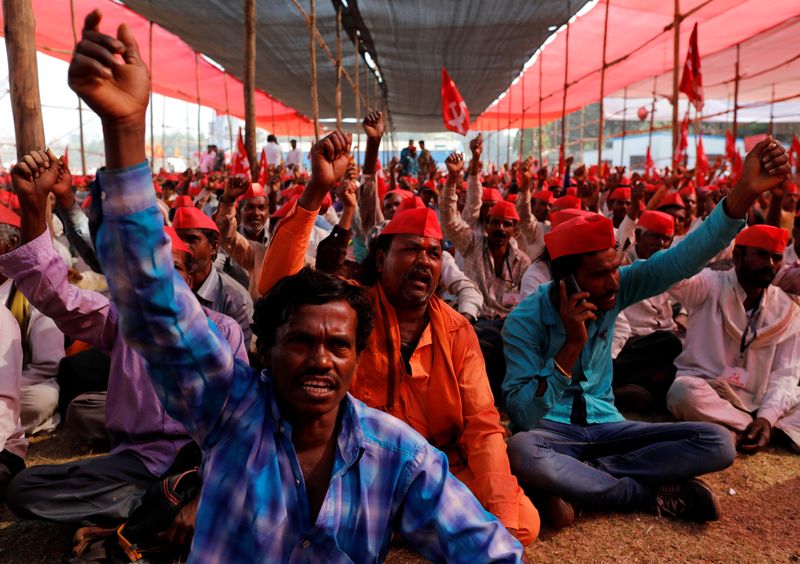By Rajendra Jadhav
SATARA, India (Reuters) - Indian Prime Minister Narendra Modi has taken several pro-farmer but inflation-stoking measures in recent months, such as easing curbs on rice and onion exports, but that may not prove enough for him to sway an election on Wednesday in a key state.
Maharashtra, which includes the city of Mumbai, is a major grower of sugarcane, soybean, cotton and onions, but opinion polls - which have a patchy record in India - suggest Modi's alliance may struggle to retain the local legislature as farmers say they have yet to benefit from the recent measures.
An opinion poll by Lok Poll, covering more than 86,000 people in Maharashtra, showed last week that a coalition of opposition parties including Congress could wrest back the state with up to 162 of the 288 seats. It said low prices for crops such as soybean and cotton were a factor.
Other surveys have also said the BJP alliance could lose. Votes will be counted on Nov. 23.
Modi's Bharatiya Janata Party (BJP) lost its parliamentary majority in national elections held between April and June partly due to farmers' anger with the export curbs, which they felt prioritised Indian consumers above growers by keeping domestic prices low.
In that national election, opposition parties won two thirds of the parliamentary seats in Maharashtra.
"We faced a setback during the parliamentary elections because of the restrictions on onion exports," senior BJP leader and Maharashtra deputy chief minister, Devendra Fadnavis, told an election rally on Sunday.
"We have now lifted those curbs and Prime Minister Narendra Modi's government will not impose export bans abruptly."
India has removed export restrictions on rice and onions, and raised the tariffs on imported edible oil in a bid to help local growers of mustard and soybean get better prices at home.
TOO LATE
But farmers say the steps have come too late, as they had already harvested and sold their produce like onions to traders, who are now benefiting from a surge in domestic prices.
Retail inflation soared to its highest level in 14 months in October, partly due to high prices of edible oils, onions and tomatoes.
"When we were selling onions in March and April, the government didn't allow exports," said farmer Mahesh Gore in Maharashtra's Nashik district.
"We were forced to sell onions at 10 rupees per kg. If they had allowed exports then, we could have got double the price. Now prices are at 50 rupees, but only traders are benefiting."
In recent years, India restricted onion exports whenever wholesale prices rose above 20 rupees.
Other farmers say they are not getting a good price for crops like soybeans because of a global glut now.
Mahesh Khade said he was barely getting 3,900 rupees per 100 kg now for soybeans compared with 4,600 rupees a decade ago. Prices of diesel, fertilisers, and other inputs have more than doubled in the same period.
"They have ignored farmers' interests," Khade said, adding he would switch sides now and vote for the opposition.

The BJP did not respond to requests for comment.
($1 = 84.38 rupees)
